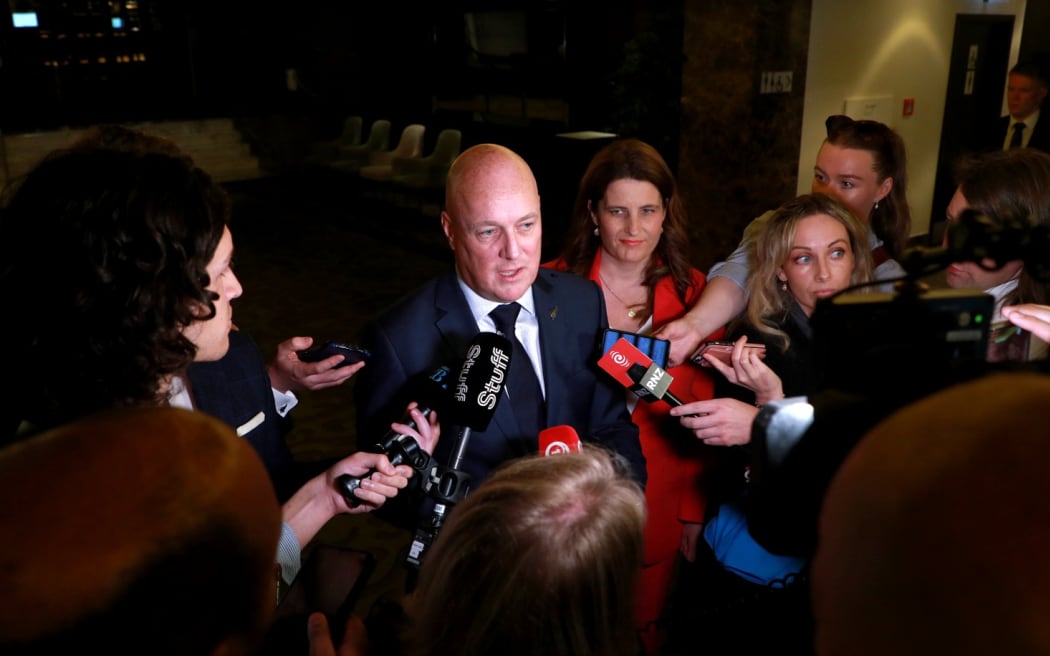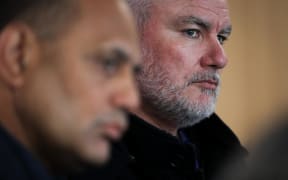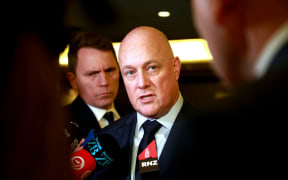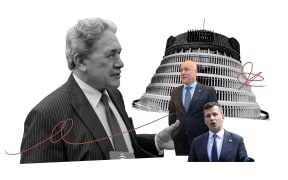
Photo: RNZ
Power Play - The new government is heading towards a three way coalition deal, a unique situation and an arrangement putting ACT and New Zealand First in direct competition for prized Cabinet seats, and plum roles like deputy prime minister.
Government talks are getting to the sharp end with each party wanting to make sure they leverage the maximum influence, policy guarantees and the highest ranked ministerial posts possible. How the government will operate - particularly when disagreement breaks out - is also important to establish early on.
Policy matters are now settled and discussions are moving on to ministerial and Cabinet positions.
Last night, another crucial step, with ACT and New Zealand First given the opportunity to eyeball each other's deal.
National leader Chris Luxon has already claimed prime minister for himself and finance for deputy Nicola Willis. The role of speaker, while influential in its own way, would hold little appeal to either support party. That leaves deputy prime minister - a symbolic nod to the seniority of the party that holds it, a position of access and influence and the opportunity to step up when the prime minister is out of the country.
If finance is off the table then how do the other two ensure they have the necessary delegations and rock solid commitments, without the powerhouse decision-making that sits with the finance minister? After its coalition with Labour from 2017-2020 New Zealand First will be alert to closing down any possibility of National sliding past promises due to non-committal language in the written agreements.
Having three parties in Cabinet could also put pressure on the number of ministers National could give its own people, if, for example, each support partner was looking for three Cabinet seats, and one or two more ministers outside. With strict instructions for the public service to downsize, surely the new government will set the example with the size of its own executive.
Arriving at the Cordis this afternoon, Luxon told waiting reporters they had achieved a "significant milestone overnight", having "closed out and agreed [National's] policy programmes" with ACT and New Zealand First.
Conversations continued this morning, he said, "to make sure that they can both sign on to each other's policy programmes and agendas that we've agreed with them individually".

National Party leader Christopher Luxon arriving at the Cordis in Auckland on Monday 20 November 2023. Photo: RNZ / Nick Monro
Today the plan was to "kick on and move on into ministerial responsibilities and Cabinet positions".
He and National are under pressure to seal the deal: ACT will be looking for the recognition and ministerial clout reflecting the number of seats it brings to the table, and its position as a consistent political partner-in-waiting.
It has campaigned hard on smaller government, less regulation, cutting spending and a different approach in education, health and "democracy and co-government", which includes the referendum on on the Treaty of Waitangi and its principles.
Warnings about the division and backlash such a move could cause, from both sides of politics, would suggest National will have to look for a compromise all three can sign up to. Getting rid of the Crown Māori Relations ministerial portfolio, then moving to excise treaty references from legislation may send the necessary signals to those voters who expect to see change, without reaching for a full referendum.
New Zealand First will want to secure its place back in Parliament, for the movement to become a consistent presence past the next election. Its opposition to reopening the housing market to foreign buyers puts it directly in conflict with the tax National wants to levy against said buyers, to fund its tax cut programme. If that is a non-negotiable, National will have to find $750 million a year somewhere to fund its promised tax relief.
That's already in the context of National's hard campaigning against wasteful spending and largesse, the government books already squeezed to the limit, and its other partner ACT driving for deeper and more far-reaching spending cuts. Key New Zealand First policies, like the 'new' Provincial Growth Fund, renamed the "Regional Productivity Growth Fund", no doubt with similar expectations of $1 billion of annual funding and ramped up infrastructure investment, would not come cheap. Something will have to give.
Much of National's intended '100 day plan' can be dealt with through legislative changes under urgency. The promised mini-Budget will be a crucial first action; it will reflect not only National's own campaign promises but also the cost of any concessions for ACT and New Zealand First.
There are no constitutional deadlines by which a government must form, but Parliament must reconvene within six weeks of the return of the writ - which this year was on 9 November.
The clock is now ticking on both public patience and the days the new government has left before Christmas to start putting its plan in place.







